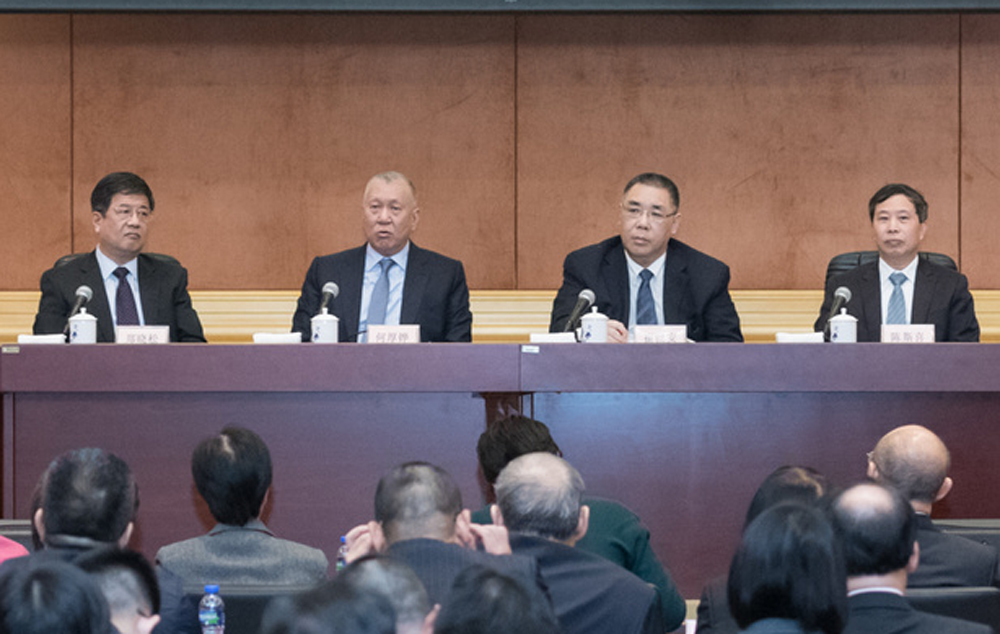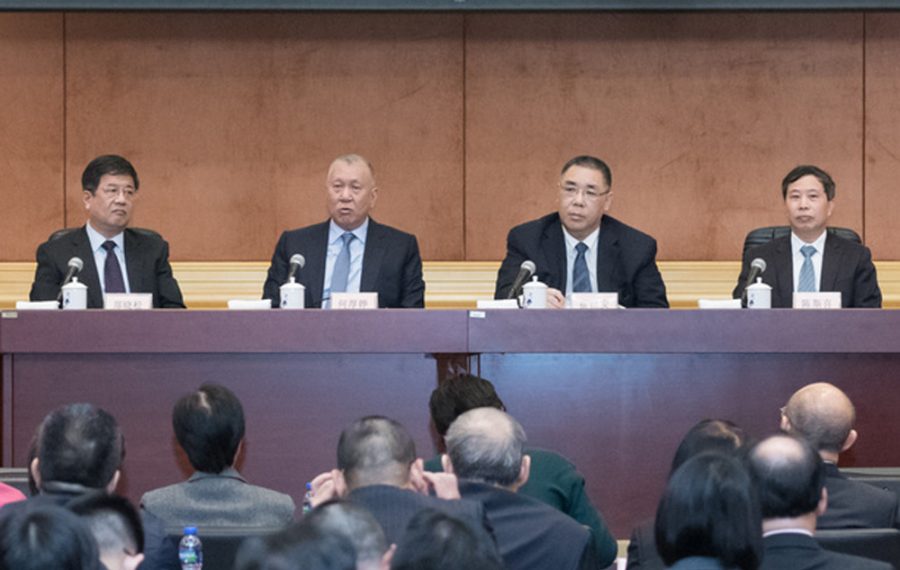Central People’s Government Liaison Office in Macau Director Zheng Xiaosong Monday urged Macau residents to respect and acknowledge the leadership held by the Communist Party of China (CPC) over the nation.
Zheng made the remarks while delivering a speech during a seminar which assessed the “spirit” that emanated from the recently-completed “two sessions”- the annual sessions of the National People’s Congress (NPC) and the National Committee of the Chinese People’s Political Consultative Conference (CPPCC). The “two sessions” take place in March every year.
The first session of the 13th NPC, which began on March 5, closed on Tuesday last week, while the first session of the 13th CPPCC National Committee, which started on March 3, ended on March 15.
In addition to Zheng, Chief Executive Fernando Chui Sai On and his predecessor Edmund Ho Hau Wah, now a vice-chairman of the CPPCC National Committee, also addressed the seminar hosted by Zheng’s office.
During the seminar held at the liaison office in Zape, Legislative Assembly (AL) President Ho Iat Seng, the sole local member of the NPC Standing Committee, and Liu Chak Wan, a local member of the Standing Committee of the CPPCC National Committee, talked about the “spirit” resulting from the recently-concluded “two sessions”.
About 400 people attended Mondays’s seminar, including other senior officials of the liaison office, senior local government officials, local NPC deputies and local CPPCC members, as well as senior personnel of the central government’s organisations posted to Macau and senior members of state-owned enterprises (SOEs) based in the city.
Zheng said that for the continuation of the successful implementation of the “one country, two systems” principle, Macau needs to strive for four things.
The first thing is for the Macau government to fully and accurately implement the “one country, two systems” principle and to administer the city in strict accordance with the nation’s Constitution and the Macau Basic Law, he said.
Zheng said that for the implementation of the “one country, two systems” principle to “keep advancing”, Macau residents’ awareness of the “one country” – the fact that Macau is an inalienable part of the nation – should be consolidated, adding that the “two systems” component only exists in conjunction with the “one country” component.
Zheng also said that any acts of jeopardising the country’s sovereignty and challenging the powers held by the central government and the supremacy of the Macau Basic Law are absolutely not allowed.
Zheng urged Macau to “organically” combine the “one country” component with the “two systems” component, as well as to uphold the central government’s “overall jurisdiction” over the city while safeguarding Macau’s high degree of autonomy.
Zheng underlined that the Macau Basic Law originates from the nation’s Constitution. “The Macau Basic Law and the Macau Special Administrative Region do not exist without the Constitution as their root,” he said.
Zheng also said that the nation’s Constitution reflects the achievements resulting from the nation’s revolutions, development and reforms carried out by the Chinese people led by the Communist Party of China (CPC).
Zheng went on to say that residents of Macau – as a special administrative region of the country – should strengthen their awareness of the existence of the nation’s Constitution and uphold its supremacy.
Zheng, a former vice-governor of Fujian province, also said that Macau residents should respect and acknowledge the CPC’s leadership over the nation’s governance. “The leadership [over the country] held by the Communist Party of China results from the choices of the country and its people throughout history,” he said.
Zheng said that the second thing is for local residents to support the Macau government and the chief executive in administering the city in accordance with the law, as well as in promoting Macau’s “healthy” socioeconomic development in a sustainable way.
Zheng said the third thing is for civil society to continue pushing Macau to integrate itself with the nation’s development and to deepen its exchanges and cooperation with the mainland.
Zheng, who has headed the office since last September, said the fourth thing is for Macau to promote its fine tradition of loving the country and Macau and to consolidate its existing good foundation on which Macau’s society and political landscape are based.
Meanwhile, Chui pledged in his speech that the local government would obtain a deep understanding of the “spirit”, resulting from this year’s “two sessions”.
Chui also said that his government would put further emphasis on the city’s development, improving local residents´ livelihoods and providing them with a wider range of benefits, and improving its governance.
He pledged that the local government will be courageous in taking up new missions together with the nation’s continued development. He also said his government would lead Macau to march on a new journey for its continued development.






